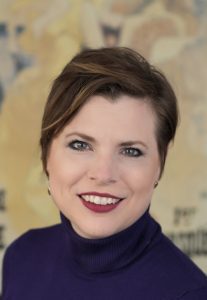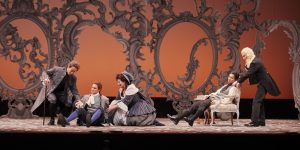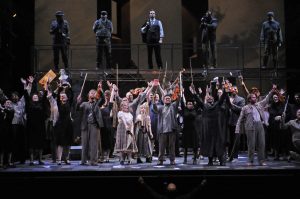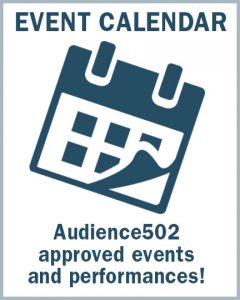 Kentucky Opera was founded in 1952 and designated the State Opera of Kentucky in 1982. The mission of Kentucky Opera is to enrich and engage our community through spectacular music, creative storytelling and the thrill of the human voice. The Kentucky Arts Council, the state arts agency, supports Kentucky Opera with state tax dollars and federal funding from the National Endowment for the Arts.
Kentucky Opera was founded in 1952 and designated the State Opera of Kentucky in 1982. The mission of Kentucky Opera is to enrich and engage our community through spectacular music, creative storytelling and the thrill of the human voice. The Kentucky Arts Council, the state arts agency, supports Kentucky Opera with state tax dollars and federal funding from the National Endowment for the Arts.
Audience publisher, Douglas Dreisbach, sat down with Kentucky Opera’s General Director, Barbara Lynne Jamison, to talk about how the organization is dealing with our current challenges. This interview also appears in the April edition of Audience Magazine.
 Douglas Dreisbach: How are you doing, and how are your staff and performers doing right now?
Douglas Dreisbach: How are you doing, and how are your staff and performers doing right now?
Barbara Lynne Jamison: We’re doing all right. My team has been working from home since March 13th, and that’s been a challenge for us because we’re a community. Our office is its own little community, and we miss each other. But we’re meeting by video conference regularly and keeping spirits up, and we have a lot of work to do getting ready for next season. We don’t know what the next few months will look like, but what we are committed to doing what keeps our community safe and healthy.
I give kudos to my staff and the staff of Kentucky Performing Arts, where we perform, for jumping so quickly to help make all of these tough decisions to postpone our upcoming opera and other events. I think we’re very fortunate in this state to have a governor who’s leading very strongly and being very communicative. That was helpful for us, as we started to navigate through this uncharted territory.
DD: That day you started seeing cancellations and stages around the world started going dark, and you knew the inevitable was coming, what were your thoughts? And looking back, were some of those thoughts accurate?
BLJ: We postponed Robin Hood on March 12th. I had moved here from Seattle, and I was watching very closely what Seattle was going through, and we actually postponed Robin Hood just as the governor was tightening down his recommendations. This show included dozens of kids, and when you’re working in a rehearsal room with dozens of kids ages 8 to 18, staging them with so much movement and interaction, I was concerned about them. So, we postponed that right away.
This has forced us to think a little differently about how we were going to reach our community over this spring and summer, because the performing arts is really all about being together with your community and bringing a community into the same space. We know that there are benefits to being in a space with different people. And so, that’s what we’re based on. But what does being together mean when all we have is a telephone or a computer screen?
DD: Tell me about your role with the Kentucky Opera. What were some of your top priorities over the last two years, pre-coronavirus? What were some of your roles and responsibilities?
BLJ: My main roles and responsibilities include being the chief executive of the company, as well as the artistic director of the company, so I hold both of those hats. And that’s not unusual in an opera company. Some of my objectives and goals, when I first got here — and still are— are looking at ways to reach families with youth and younger audiences, as well as new audiences, and we’ve been rehearsing a youth opera, our first youth opera in many years, Robin Hood. We’ve had to postpone that, unfortunately, but that was something that we’ve been working on diligently throughout the year. It’s also important to us to make sure that we’re producing great operas that speak to the current condition of our society. The opera’s we’re choosing to produce must prove, no matter when they were writing, that they’re significant to who we are today in the 21st century.
We’ve had a really successful season on the main stage. We just closed our season with The Marriage of Figaro, and I was very pleased with how it turned out, and I heard our audiences were very pleased, as well. Now we’re on to getting ready for the next season now.
I think, in that regard, it’s made us think a little differently on the mechanics of what we’re doing. But essentially, our mission and our goals and objectives remain very steadfast. We are a community organization, a community engagement company that does great art on the stage with a distinct purpose of connecting our community. How we reach our community when we can’t gather together is a challenge, but it’s one we’re trying to embrace. I do believe that constraint is the mother of creativity. And for the arts, creativity is where we excel. We are embracing the challenge, and I believe we’ll come out a much stronger company because of it.
 DD: Why do you feel like the arts are so important to our community and the overall mental state of our society?
DD: Why do you feel like the arts are so important to our community and the overall mental state of our society?
BLJ: The arts have always been important to humans. As long as humans have existed, we’ve come together to celebrate our happiest times and mourn our losses with the arts. Human relics show that humans painted on cave walls. We sang songs, beat drums, created instruments, acted out stories around a campfire — long before stages, curtains, and lights!
We know they’re important. And I’m really encouraged to see how many professional and amateur artists and musicians alike have taken to expressing themselves through music, art, and drama on social media. It just shows that, when we are at our best and at our worst, we call on the arts to connect us and to express our deepest joys and fears. It’s how we connect.
One of the main reasons I moved to this community is because I saw how much it truly valued the arts. This is also one of the most community-oriented places I’ve ever lived. It’s all about being together here. And I think it makes sense that this community would value the arts, knowing that community and the arts have gone together for millennia. That’s why I believe that the arts are going to survive and thrive during this time.
DD: Being able to connect to the community is so important.
BLJ: Absolutely! I think it’s fair to say that opera has sometimes historically allowed itself to be disconnected from the heartbeat of the community. Historically, in the 19th and 20th centuries, it was an art form for a certain echelon of society. The trend for many opera companies —including Kentucky Opera — is to return our work back to opera’s original intent: that it be about the community and for the community. In a time where we can stream opera or ballet or a symphony concert from anywhere in the world, I think remembering that having an opera company, having a ballet, having a theater and an orchestra in our own community allows those art forms to amplify the heartbeat of this community — our community and our values — and to connect us here locally. I think as a place that values community that we recognize the importance all of the arts have in connecting us and making our community healthier and stronger.1
 DD: Let’s talk about the amazing new season that you announced in January. You recently announced a new season that will entail La bohème. What goes into determining the new lineup? And what can fans be excited about, about that 2021 season?
DD: Let’s talk about the amazing new season that you announced in January. You recently announced a new season that will entail La bohème. What goes into determining the new lineup? And what can fans be excited about, about that 2021 season?
BLJ: I think what goes into it — our first priority is thinking about, “What are the themes that will resonate with our community today?” We know that this is a community that, as I said earlier, cares about being together, cares about taking care of one another and being a healthy society, healthy community, all around, and knowing that that takes all of us to do our part. La bohème is about a group of people, a family, that have chosen each other, friends that have chosen each other as family. Some people may recognize this story in its adapted format as the Broadway musical Rent. These friends come together to help each other and be together. I think now, more than ever, it’s probably going to take some different undertones than it might have before this crisis. But that’s what’s important to us is that through these operas we recognize and celebrate the universal human stories that they contain. They still apply to today.
DD: How are you staying busy during these times and using the time for some creative exploration for yourself?
BLJ: I really am enjoying seeing all the arts that are happening on the Internet. I’m really enjoying seeing things that we normally don’t get to see because companies have opened up access to these. I’m really grateful for those companies, and their artists and their unions, who have been able to make arrangements to make these available to the general public.
DD: Are you doing any local restaurant takeout or delivery that you would like to give a shout out to?
BLJ: I will say that as a nonprofit, we often reach out to our local small businesses to ask for support and sponsorships during our season, so I’ve felt during this time it’s really important to try to bring awareness and support to our small businesses during this time.
We actually did a great takeout from Butchertown Grocery. They’ve been doing great over there, and I’d just give them a shout-out for their work. They’ve been great! I look forward to trying more and will keep an eye out for the recommendations that you hear of. Thank you for spreading the word, and many thanks to Audience for sharing the stories of our performing arts organizations during this time!





